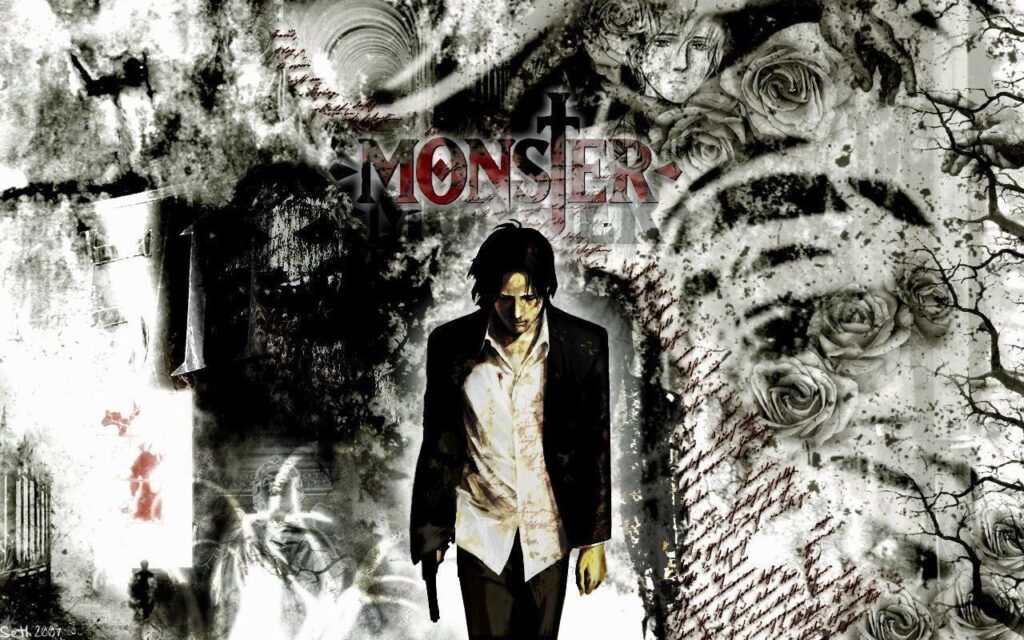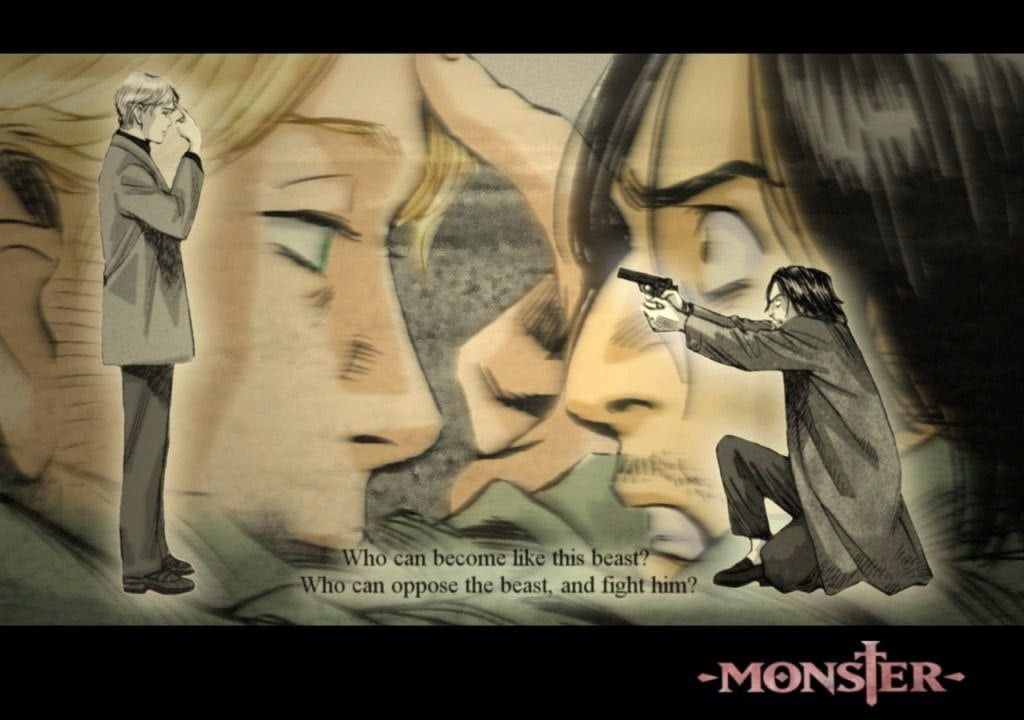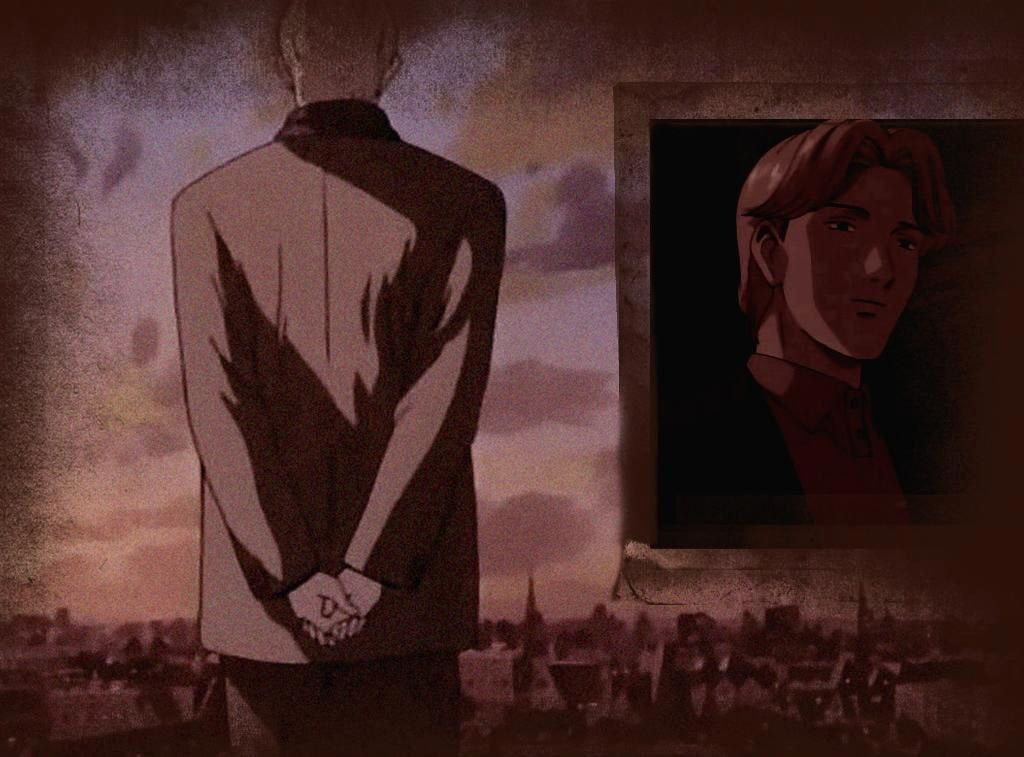
Monster is a critically acclaimed Japanese anime series based on the manga of the same name written and illustrated by Naoki Urasawa. The anime, directed by Masayuki Kojima, first aired in Japan from April 2004 to September 2005. With 74 episodes, Monster is known for its complex narrative, psychological depth, and intense character development.
Plot Summary:
The story revolves around Dr. Kenzo Tenma, a brilliant and compassionate neurosurgeon working in Düsseldorf, Germany. His life takes a drastic turn when he faces a moral dilemma. In a moment of crisis, he has to choose between saving the life of a young boy named Johan Liebert or the town’s mayor. Tenma opts to save Johan, a decision that has far-reaching consequences.
As Johan grows up, Tenma discovers the dark and mysterious nature of the boy he saved. Johan becomes a charismatic and manipulative figure, leaving a trail of violence and chaos wherever he goes. Tenma embarks on a quest to stop the monster he inadvertently created by saving Johan. The narrative unfolds as Tenma delves into the criminal underworld and uncovers a conspiracy involving secret experiments, political intrigue, and a series of murders.
Characterization:
One of Monster’s strengths lies in its well-developed characters. Dr. Kenzo Tenma is a deeply empathetic protagonist whose internal struggle with guilt and responsibility propels the narrative forward. Johan Liebert, the enigmatic antagonist, is a psychologically complex character with a haunting past. Johan’s ability to influence people and instigate chaos adds layers of tension to the story.
The supporting cast is equally compelling. Nina Fortner, Johan’s twin sister, plays a crucial role in the narrative. Her journey to uncover the truth about her past and her connection to Johan is a central element of the series. Other characters, such as Inspector Heinrich Lunge and Detective Suk, contribute to the intricate web of the plot.
Themes:
Monster explores a myriad of themes, making it a thought-provoking and intellectually stimulating series. One prominent theme is the duality of human nature. The contrast between good and evil is not presented in a simplistic manner; rather, the characters grapple with moral ambiguity and the potential for darkness within us all.
Ethical dilemmas and the consequences of choices are recurring motifs in Monster. Tenma’s decision to save Johan leads to a cascade of events that challenge traditional notions of right and wrong. The series also delves into the impact of trauma on the human psyche, as many characters carry emotional scars from their past.
Political and social commentary is another aspect of Monster. The story unfolds against the backdrop of post-Cold War Europe, exploring issues such as xenophobia, corruption, and the legacy of totalitarian regimes. The series provides a critical examination of power dynamics and the abuse of authority.

Narrative Complexity:
Monster is renowned for its intricate and tightly woven plot. The narrative is filled with twists and turns, keeping viewers on the edge of their seats. The story seamlessly weaves together multiple perspectives, gradually revealing the interconnectedness of characters and events. The pacing is deliberate, allowing for thorough exploration of each subplot and character arc.
The series also incorporates elements of mystery and suspense. As Tenma pursues Johan, he uncovers layers of conspiracy that lead to a shadowy organization known as the “Monster.” This adds an element of intrigue and tension to the narrative, as Tenma becomes entangled in a web of deception and danger.
Art and Animation:
The animation in Monster may not be as flashy or stylized as some other anime, but it effectively serves the series’ tone and atmosphere. The character designs by Kitaro Kosaka capture the realism of the manga, and the animation by Madhouse maintains a consistent quality throughout the series.
The subdued color palette contributes to the mature and serious tone of the narrative. The animation excels in conveying the psychological nuances of the characters, especially during intense and emotional scenes. The backgrounds are meticulously crafted, providing a sense of realism to the European settings.

Soundtrack:
The music in Monster, composed by Kuniaki Haishima, complements the dark and suspenseful atmosphere of the series. The opening theme, “Grain” by Kuniaki Haishima, sets the tone for the psychological thriller, while the hauntingly beautiful ending theme, “For the Love of Life” by David Sylvian, adds an emotional layer to the series.
The use of sound is effective in building tension, and the voice acting, both in the original Japanese and the English dub, is commendable. The voice actors successfully convey the emotional depth of the characters, adding to the overall impact of the storytelling.
Legacy and Impact:
Monster has left a lasting impact on the anime community and is often regarded as one of the best psychological thrillers in the medium. Its mature themes, complex characters, and intricate plot have garnered praise from critics and viewers alike. The series has influenced subsequent anime and has a dedicated fan base that continues to grow.
The success of Monster lies not only in its entertainment value but also in its ability to provoke thought and discussion. It challenges viewers to reflect on the nature of humanity, morality, and the consequences of our choices. The anime has gained recognition beyond the anime community and is often recommended to those who may not typically watch animated series.
Conclusion:
Monster is a masterfully crafted anime that transcends traditional genre boundaries. Its gripping narrative, well-developed characters, and exploration of profound themes set it apart as a standout work in the medium. The series demands intellectual engagement from its audience, rewarding them with a thought-provoking and emotionally resonant experience. Whether you are a fan of psychological thrillers, character-driven dramas, or complex narratives, Monster offers a unique and compelling journey that leaves a lasting impression.
FAQ
1. What is Monster about?
- Monster is an anime series based on the manga by Naoki Urasawa. It follows the story of Dr. Kenzo Tenma, a skilled neurosurgeon, as he becomes entangled in a web of mystery and danger after making a crucial moral decision that alters the course of his life.
2. Who is the main protagonist?
- Dr. Kenzo Tenma is the main protagonist. He is a compassionate and skilled neurosurgeon who faces moral dilemmas and strives to rectify the consequences of a decision he made in the past.
3. Who is the antagonist?
- Johan Liebert is the enigmatic and manipulative antagonist. He is a character shrouded in mystery, and his actions have far-reaching consequences throughout the series.
4. How many episodes are there in Monster?
- Monster consists of 74 episodes, which originally aired in Japan from April 2004 to September 2005.
5. Can Monster be watched on streaming platforms?
– Availability may vary, but Monster is often found on popular streaming platforms that host anime. Check streaming services to see if Monster is currently available in your region.
6. Is the anime a faithful adaptation of the manga?
– Monster is generally considered a faithful adaptation of Naoki Urasawa’s manga, capturing the essence of the source material and bringing it to life through animation.
7. Does the anime have a conclusive ending?
– Yes, Monster has a conclusive ending that ties up the major storylines. Viewers can expect a resolution to the mysteries and character arcs introduced throughout the series.
8. What makes Monster stand out among other anime?
– Monster stands out for its complex narrative, well-developed characters, mature themes, and its ability to provoke thought and discussion. It offers a unique and compelling experience that appeals to a wide range of audiences.
9. Can I watch Monster if I’m not a fan of anime?
– Yes, Monster is often recommended to those who may not typically watch anime due to its mature themes and realistic storytelling. It has the potential to appeal to a broader audience beyond the anime community.